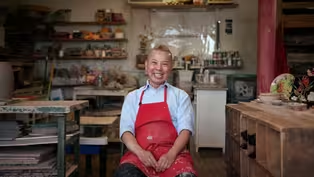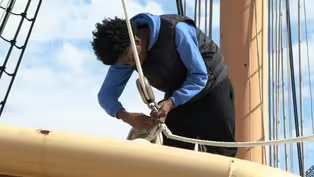
Saved from Slaughter
Clip: Season 5 Episode 42 | 8m 20sVideo has Closed Captions
An equine rescue and sanctuary cares for abused, neglected and unwanted horses.
Horse Play, an equine rescue and sanctuary in North Kingstown, has tended to more than 400 horses in its 25 years. Deidre Sharp, the owner and founder of Horse Play, says most of the horses would have been slaughtered if she had not intervened.
Problems playing video? | Closed Captioning Feedback
Problems playing video? | Closed Captioning Feedback
Rhode Island PBS Weekly is a local public television program presented by Ocean State Media

Saved from Slaughter
Clip: Season 5 Episode 42 | 8m 20sVideo has Closed Captions
Horse Play, an equine rescue and sanctuary in North Kingstown, has tended to more than 400 horses in its 25 years. Deidre Sharp, the owner and founder of Horse Play, says most of the horses would have been slaughtered if she had not intervened.
Problems playing video? | Closed Captioning Feedback
How to Watch Rhode Island PBS Weekly
Rhode Island PBS Weekly is available to stream on pbs.org and the free PBS App, available on iPhone, Apple TV, Android TV, Android smartphones, Amazon Fire TV, Amazon Fire Tablet, Roku, Samsung Smart TV, and Vizio.
Providing Support for PBS.org
Learn Moreabout PBS online sponsorship- I've always been drawn to them.
I've always enjoyed the company of horses.
Every day I say thank you.
I do.
And I love this place.
This is paradise for me, for the ponies.
It is.
It's just, it's a wonderful, wonderful place.
(Deidre whistles) - [Michelle] For Deidre Sharp, caring for horses is not a job, it's a passion.
- Let's go.
Quick, quick, quick, quick, get.
- [Michelle] A passion that gets her out of bed at 3:00 AM.
- I never wake up in the morning and go, "Oh my God."
No, I look forward to getting up.
- [Michelle] Sharp is the founder and president of Horse Play an equine rescue and sanctuary in North Kingstown.
- Harry.
- [Michelle] On this quiet farmstead, Sharp and a small but devoted group of volunteers care for abused, neglected, and unwanted horses.
- Harley!
Junior, let's go!
- [Michelle] The majority of the horses that are coming here, what circumstances are they coming from when they arrive here?
- Right now, I would say predominantly lack of knowledge on the owner's part and it turning into a much bigger issue to take care of the horse than they thought.
Whether it be behavioral, financial, a lot of financial issues where people can no longer afford their horse.
- [Michelle] Too often, she says, people part ways with their horses once they're no longer of value to them.
- It's not what can they do for the horse, it's what can the horse do for them?
And when the horse can no longer do for them, then it gets unloaded.
- Mandy Crow has been volunteering at Horse Play for 14 years.
She says many of the horses that have roamed these fields were once viewed as disposable.
- People get tired of them, kids grow up, they lose interest, and horses live for 30 odd years and it's a big commitment for some people and they're just not able to follow through.
At least there's some horse rescues out there that help take care of them.
(gentle music) - Jump up.
Come on, Tom.
- [Michelle] Sharp started Horse Play 25 years ago as a therapeutic riding program for people with mental and emotional challenges.
Over time, it evolved into a sanctuary that's helped more than 400 horses.
Many were headed to an auction when Sharp intervened.
- They're bought by a kill buyer or a meat buyer.
They send them up to Canada where they're slaughtered and the meat is sent overseas.
Places like France, Japan, Italy, I believe, and even Canada itself.
They do eat horse meat there and that's unfortunate, but that's where a lot of horses go.
- And a good number of the horses that you've rescued, you would say, were headed down that road?
- Very much so.
Very much so.
- [Michelle] There are no horse slaughter plants in the United States, but according to the ASPCA, the American Society for the Prevention of Cruelty to Animals, many horses in the country are taken to facilities in Mexico and Canada to be killed for their meat.
- I've had people call me, "Oh, we're interested in," you know, and it's my two biggest horses, and I'm thinking, "And who are you?"
And I find out they actually drive for a meat packing person.
So no, you're not adopting my two horses.
But again, it's by the pound and it's unfortunate, but it is happening every day.
- [Michelle] It's a reality that's troubling for Steven Viens.
10 years ago, he felt called to volunteer with horses.
He picked up the phone and has been at Horse Play ever since.
- They're incredible animals and I tell anybody that if you don't love horses, it's because you don't know any.
There's nothing like 'em.
Once you get used to 'em, they're family.
- [Michelle] These days, it's a blended family of nine horses from all walks of life, including Buddy, a 21-year-old Tennessee walking horse.
Some have behavioral issues.
Others, like Reno, have medical ones.
The roughly 22-year-old American Mustang, named after a city in his home state of Nevada, is going blind, and that's not all.
- His right hind foot was injured when he was rounded up and he was lame and it became a chronic problem and he has never been able to heal totally from it.
He's crippled, essentially.
- Running the sanctuary is a full-time commitment, but it's not Sharp's only job.
During the day, she works as a police clerk at the Newport Police Department.
You work at the police department in large part to fund the work here at the sanctuary?
- I sure do.
Yep.
Unfortunately, there is no funding or very little minimal funding for what we do.
The costs are exorbitant.
- [Michelle] Sharp says about 75% of the organization's expenses come out of her own pocket and costs have gone up, including the price of hay and trips to the vet.
Volunteers, like Mary Cadieux, are grateful Sharp contributes so much.
- It takes a lot to take care of a horse.
Big animals require big space, lots of times, big dollars.
I do wonder and worry where they would be if not for what Deidre has done for a long time.
And of course, the volunteers.
We love doing this, too.
- [Michelle] Steven Viens admits it can be a lot of work.
Some days, he says, he can barely move when he gets home.
He puts in five hours a day, three days a week.
But he says it's well worth it.
- I don't have to pay for counseling because I get all the counseling from the horses.
It's something just totally different.
And you don't even know this place exists.
And when you turn up that driveway and you drive up here, this is another world up here.
(horse whinnies) - [Michelle] It's a world that's still amazes Sharp 25 years later.
And she's quick to point out, she doesn't view these horses as her children.
She says they're her brothers and sisters and teachers.
What have you learned from them?
- Family, friends.
Don't need to do it all by yourself.
You know, seriously, you gotta, you know, the community, pay attention.
Listen, feel, don't be afraid to feel, 'cause they do.
They can feel, sense your heartbeat, four or five feet away.
I think that's what I've learned a lot from them.
Sensitivity to others.
- No horses are currently up for adoption,
Video has Closed Captions
Clip: S5 Ep42 | 6m 5s | Inside Dwo Wen Chen’s pottery studio. (6m 5s)
Video has Closed Captions
Clip: S5 Ep42 | 4m 49s | A date has not been set for opening a new westbound Washington Bridge. (4m 49s)
Video has Closed Captions
Clip: S5 Ep42 | 7m 26s | Rhode Island’s Tall Ship, the Oliver Hazard Perry is about education as well as recreation. (7m 26s)
Providing Support for PBS.org
Learn Moreabout PBS online sponsorship
- News and Public Affairs

Top journalists deliver compelling original analysis of the hour's headlines.

- News and Public Affairs

FRONTLINE is investigative journalism that questions, explains and changes our world.












Support for PBS provided by:
Rhode Island PBS Weekly is a local public television program presented by Ocean State Media


